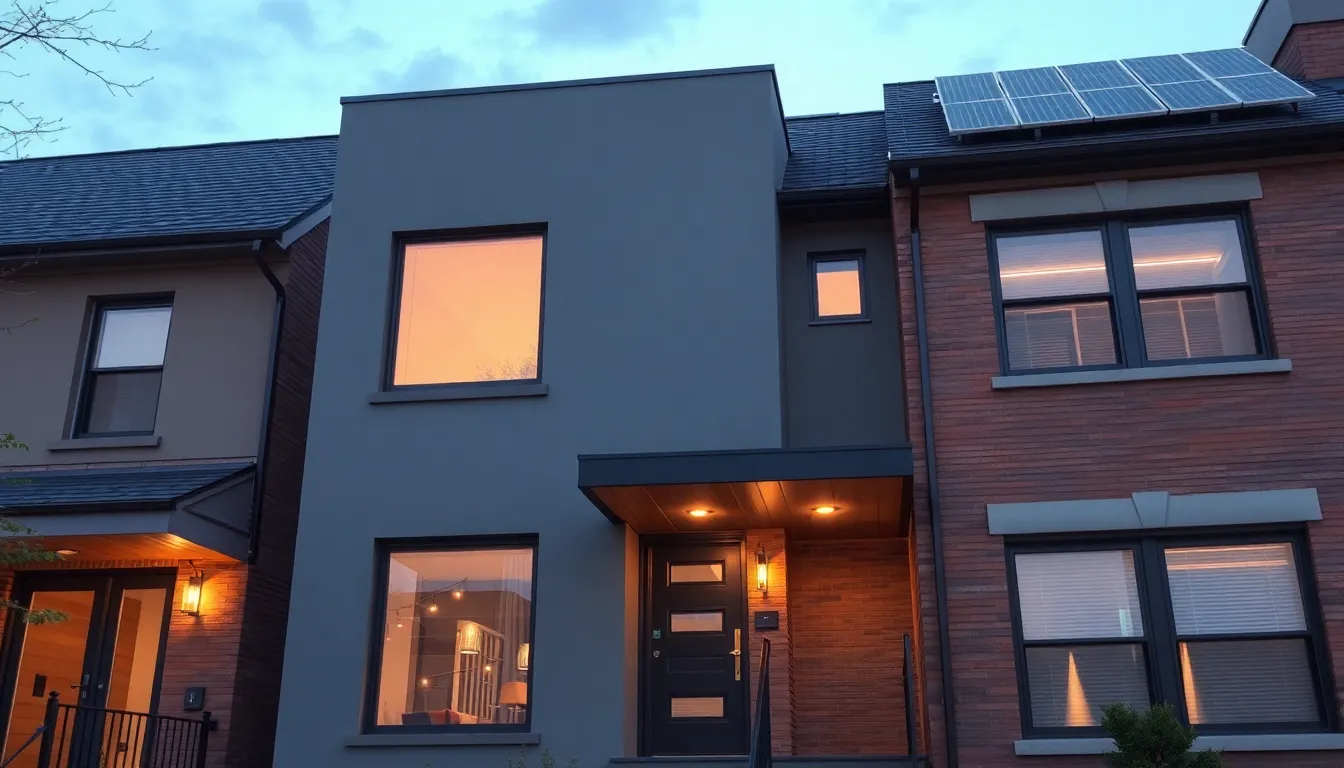Table of Contents
ToggleIn the bustling heart of Chicago, where winter chills and summer heat can be as unpredictable as a politician’s promise, smart homes are transforming the way residents live. Imagine a home that knows when you’re cold and adjusts the thermostat faster than you can say “deep dish pizza.” Smart technology isn’t just a luxury; it’s becoming a necessity for those looking to simplify their lives and save a few bucks on energy bills.
Overview of Smart Homes in Chicago
Smart homes in Chicago integrate advanced technologies to enhance convenience and efficiency for residents. These homes utilize devices such as smart thermostats, security cameras, and lighting systems, all controllable through mobile apps or voice commands. The adoption of smart home technology in Chicago has surged due to significant benefits, including improved energy management and enhanced security.
Smart thermostats like the Nest or Ecobee adjust heating and cooling based on occupancy patterns and weather forecasts, optimizing energy usage. During the frigid winters, these devices promote energy savings by automatically reducing heating when residents are away. Smart security systems, featuring cameras and smart locks, enable homeowners to monitor property from anywhere, enhancing safety in urban neighborhoods.
Moreover, the rise of smart home technology coincides with Chicago’s commitment to energy efficiency. Data from the U.S. Department of Energy indicates that smart homes can significantly decrease energy expenditure by up to 30%. As energy prices fluctuate seasonally, smart homes help residents manage costs effectively.
Chicagoans also benefit from local utilities offering incentives for energy-efficient upgrades. For instance, ComEd provides rebates for installing smart thermostats and energy-efficient appliances, further encouraging widespread adoption.
Incorporating smart home solutions contributes to a more sustainable lifestyle. These technologies allow for real-time monitoring of energy use, enabling residents to make informed decisions and lower their carbon footprints. Smart homes collectively improve the quality of life while responding to the unique weather challenges faced in the region.
Overall, smart homes in Chicago represent a shift towards modern living that prioritizes efficiency, security, and sustainability.
Benefits of Smart Homes

Smart homes in Chicago offer numerous advantages that enhance daily life while addressing specific needs of residents.
Enhanced Security Features
Enhanced security features significantly improve homeowners’ sense of safety. Smart cameras provide real-time video feeds, allowing users to monitor their properties remotely. Smart door locks enable keyless entry, which increases convenience while preventing unauthorized access. Alarm systems integrate with mobile apps, sending instant alerts in case of suspicious activity. Some systems even include facial recognition technology to identify visitors. Overall, these security advancements create a more secure living environment in urban settings, aligning with the priorities of Chicago residents.
Energy Efficiency and Cost Savings
Energy efficiency and cost savings form core benefits of smart homes. Smart thermostats adjust temperature settings based on real-time data, optimizing energy consumption and reducing heating and cooling costs. Smart lighting systems automatically turn off when rooms are unoccupied, preventing wasted electricity. Such systems can lead to energy savings of up to 30%, according to local utility data. Residents in Chicago can also take advantage of incentives offered by ComEd for energy-efficient upgrades, further decreasing overall utility expenses. These measures not only contribute to lower bills but also support the city’s commitment to sustainability.
Popular Smart Home Technologies
Smart home technologies enhance convenience and sustainability for Chicago residents. Key innovations create a more comfortable living environment while addressing energy efficiency.
Smart Lighting Systems
Smart lighting systems utilize energy-efficient LED bulbs that can be programmed to adjust brightness and color based on specific needs or preferences. Homeowners can control these lights remotely using mobile apps or voice commands, automating schedules for different rooms. Sensors detect occupancy, ensuring lights turn off automatically when spaces are unoccupied, further reducing energy waste. Such systems not only lower electricity bills but also contribute to a more sustainable home environment by minimizing unnecessary energy consumption.
Home Automation Hubs
Home automation hubs centralize the management of various smart devices, allowing seamless integration and control. These hubs connect smart thermostats, lighting, security cameras, and more, consolidating control into a single interface. Homeowners can customize settings and routines for various scenarios, such as “away” or “night” modes, enhancing convenience and energy efficiency. By streamlining control, automation hubs help users manage their homes more effectively, making it easier to adapt to Chicago’s fluctuating weather conditions.
Smart Homes and Chicago’s Real Estate Market
Smart home technology significantly influences Chicago’s real estate market, enhancing property values and attracting tech-savvy buyers. Properties equipped with smart features often sell faster, as they appeal to homeowners seeking modern conveniences and energy efficiency. With the implementation of smart technologies, homes gain a competitive edge in a crowded market.
A study by the National Association of Realtors indicates that homes with smart devices can command a 5% to 20% price premium, reflecting increased demand for innovative living spaces. Buyers prioritize energy-efficient systems, advanced security features, and integrated home automation, which lead to a more sustainable lifestyle.
Neighborhoods focused on sustainability, such as Lincoln Park and Wicker Park, showcase an increasing number of smart homes. Integration of smart technology aligns with Chicago’s goal of reducing its carbon footprint, making real estate in these areas more attractive. Additionally, local policies promoting energy efficiency encourage developers to incorporate smart technologies into new constructions, further driving market trends.
As smart home technology continues to evolve, real estate agents emphasize the importance of highlighting these features in listings. Homebuyers now expect comprehensive descriptions of smart devices, including smart thermostats, security systems, and lighting solutions. The visibility of these features in property marketing can significantly influence purchase decisions.
Financial benefits associated with smart homes also appeal to buyers. The estimated energy savings of 30% or more can lead to significant reductions in utility bills, increasing the overall value of smart-equipped homes. By addressing energy efficiency and providing enhanced security, smart homes in Chicago not only improve the quality of life but also represent a lucrative investment opportunity.
Future Trends in Smart Homes in Chicago
Innovations in smart home technology continue to shape the landscape in Chicago, focusing on increased sustainability and enhanced user experience. Smart home devices are integrating artificial intelligence (AI) to provide personalized automation for residents. AI-driven systems can learn habits and preferences, optimizing functions like lighting, temperature control, and security settings.
Increased connectivity enhances the user experience. The rollout of 5G technology allows for faster data transmission, enabling real-time responses from smart home devices. Homeowners benefit from enhanced control over their systems, ensuring energy efficiency and security at all times.
Data security remains a high priority as smart homes grow in popularity. End-to-end encryption and advanced authentication methods are becoming standard practices to protect sensitive information. Residents are adopting these measures to avoid breaches and guarantee that their smart devices remain secure.
Remote work trends influence the design and features of smart homes. Home offices equipped with smart technology, such as automated lighting, temperature controls, and sound systems, enhance productivity. Systems that enable video conferencing seamlessly integrate with existing networks, creating efficient workspaces in urban environments.
Sustainability trends will drive the adoption of renewable energy solutions. Solar panels integrated with smart home systems allow energy harvesting and real-time monitoring of energy consumption. In this regard, smart homes in Chicago align with the city’s commitment to environmental stewardship, reducing reliance on fossil fuels and promoting energy independence.
Local government initiatives support the growth of smart home technologies, offering tax incentives and grants for energy-efficient upgrades. Developers are increasingly incorporating smart technologies into new construction projects, reflecting market demands.
Enhanced user engagement through education and community programs focuses on the benefits of smart home technologies. Workshops and seminars educate residents on energy management and smart living practices, fostering a more connected and informed community.
Smart homes in Chicago are transforming how residents live and interact with their environments. By embracing advanced technologies, homeowners are not only enhancing their comfort but also contributing to a more sustainable future. The integration of smart devices fosters energy efficiency and security while adapting to the city’s unique climate challenges.
As the demand for smart features continues to rise, the real estate market is responding positively, with increased property values and quicker sales for homes equipped with these innovations. Chicago’s commitment to promoting energy-efficient solutions supports this trend, making smart homes a practical choice for modern living. The future of smart homes in Chicago looks promising, with ongoing advancements poised to further enrich the lives of its residents.









